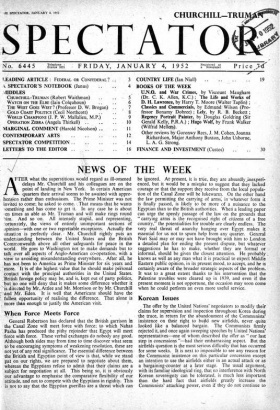When Force Meets Force
General Robertson has declared that the British garrison in the Canal Zone will meet force with force; to which Nahas Pasha has produced the pithy rejoinder- that Egypt will meet force with force. These verbal exchanges do nobody any good. Although both sides may from time to time discover what seem to be encouraging symptoms of weakening resolution, these are not yet of any real significance. The essentiadifference between the British and Egyptian point of view is that, while we stand pat on our rights, we are prepared to negotiate about them, whereas the Egyptians refuse to admit that their claims are a subject for negotiation at all. This being so, it is obviously our advantage to emphasise the comparative flexibility of our attitude, and not to compete with the Egyptians in rigidity. This is not to say that the Egyptian guerillas are a threat which can be ignored. At present, it is true, they are absurdly _inexperi- enced, but it would be a mistake to suggest that they lacked courage or that the support they receive from the local popula- tion of the Canal Zone will be lukewarm. On the other hand the law permitting the carrying of arms,' in-whatever form it is finally passed, is likely to be more of a nuisance to the Egyptian than to the British authorities. Whed a leading paper can urge the speedy passage of the law on the grounds that " carrying arms is _the- recognised .right of citizens of a free country," the potentialities for trouble are clearly endless. The very real threat of anarchy hanging over Egypt makes it essential for us not to spurn help from any quarter. General Nun Said may or may not have brought with him to London a detailed plan for ending the present dispute, but whatever suggestions he has to make, whether they are formal or informal, should be given the closest attention. He probably knows as well as any man what it is practical to expect Middle Eastern public opinion, in its present mood, to accept, and he is certainly aware of the broader strategic aspects of the problem. It was to a great extent thanks to his intervention that the Palestine troubles were cleared up in 1939, and even if the present moment is not opportune, the occasion may soon come when he could perform an even more useful service.






































 Previous page
Previous page